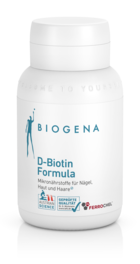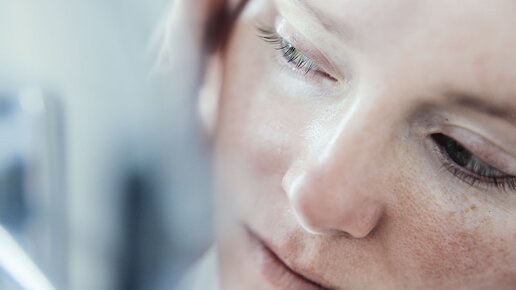Beauty has many faces. However, we are all attracted to beautiful skin and shiny hair. In our everyday use of language, we like to use the phrase “beauty comes from within”. So easily said, there is more to this idiom than you would believe: Whereas external applications such as creams, masks, etc. soon reach their limits, care with vital substances provides beauty from the inside out. This is how selected vitamins and minerals contribute to the structure and regeneration of skin and hair. If used in a targeted fashion, internal nutritional care can help us to maintain our vital strength and beauty for as long as possible. This is where biotin, a well-known beauty nutrient, comes into play.
What is biotin?
Biotin belongs to the group of B vitamins and is also called vitamin B7, vitamin H or the beauty vitamin. Biotin has many names – but whatever the name this water-soluble B vitamin is one thing: essential, i.e. vital for our body.
What is biotin important for?
As an essential component of enzymes (coenzymes), biotin is involved in many cellular metabolic processes – not least in the metabolism of macronutrients (proteins, fats and carbohydrates). It also contributes to energy metabolism and supports the normal functions of the mind and nerves. If you come across vitamin B7 on the internet and in newspapers, this will generally be in the context of beauty, because this vitamin helps maintain normal skin structures and makes a valuable contribution to the preservation of beautiful hair – and this applies to both the hair on the head and to facial hair (beards, etc.).
Occurrence in food: Where is biotin found?
It is present – if often only in low concentrations – in many foods; a healthy, balanced diet is essential. Raw eggs are considered to be particularly rich in biotin, but only the yolks. Avidin, which is present in raw egg whites, is a real biotin thief. It can interfere with biotin uptake by bonding with the vitamin to form a complex that cannot be absorbed by our intestinal cells. In practice, complex binding plays only a minor role because avidin is destroyed at temperatures above 100 °C.
Yeast and offal also have a high biotin content. Good plant-based sources include nuts, lentils, oatmeal and unpolished rice. By the way, our intestinal flora can also produce small amounts of biotin – in addition to low concentrations of vitamin K, vitamin B1 and vitamin B2.
Dosage and use
Adequate supply: How much biotin per day?
The German Nutrition Society (DGE) recommends a daily dose of 30-60 micrograms of biotin for adults and adolescents aged 15 years and older as a reference value for adequate intake. This is purely an estimate, since it is not known how much biotin our body really needs and no exact daily requirement can be given.
Who needs extra biotin?
The knowledge surrounding human biotin needs is incomplete. but it is usually assumed that a balanced diet will meet these needs, but certain factors such as regular alcohol consumption and one-sided diets may increase the need. If you want to know your needs exactly you can have your biotin status measured in a laboratory test.
Which type of biotin is best for strong nails and hair?
For the best biotin care from within, combination products containing vital substances that work together with biotin are ideal. For example, zinc has a positive effect on maintaining healthy nails, while vitamin C helps to support normal collagen formation in the skin.
When and how to take biotin correctly?
Biotin can be taken at any time of the day, but it is beneficial to take biotin capsules with enough liquid before or with a meal.
Dosage forms: Biotin tablets, capsules, drops, etc.
Biotin is available on the market in a variety of ways. While tablets and capsules are the most common forms of use, liquid preparations, such as biotin drops, are rarely seen. Those who are spoilt for choice should use high-quality biotin preparations according to the pure substance principle (= free of unnecessary excipients and additives; primarily capsule preparations) and buy from trusted providers.
How long should Biotin be taken for?
To date, no negative consequences of long-term biotin supplementation are known – at appropriate doses. By measuring a person’s biotin status it can easily be determined whether and for how long biotin should be supplemented.
Detect inadequate biotin supply
An insufficient biotin supply is not always accompanied by recognisable signs, which is why it may well be that the deficiency remains unnoticed for a long time. Anyone who wants to be sure about their biotin should therefore have their level remeasured in a laboratory diagnostic test.
Time for a biotin level check?
An insufficient biotin supply can make itself felt in different ways. The following signs may indicate that you need to check your biotin level:
- Loss of appetite
- Weakness, fatigue
- Dry, scaly skin
- Dry hair
- Brittle nails
Laboratory values: Biotin normal values
A laboratory blood test can identify individual biotin care more accurately. A classification of biotin supply can be found in the following table.
| Normal values | 300 – 1000 µg/l |
| Lower normal range / borderline supply | 200 – 300 µg/l |
| Suboptimal supply | 200 µg/l |
| To be noted before blood collection | 12 h fasting Discontinue existing biotin preparations a few days prior to blood collection |
Frequently asked questions about biotin

Keep your hair on: Diagnostic screening to detect biotin deficiencies
It may be just an appendage, but it is nevertheless impossible to imagine life without it – the hair on our head has been with most of us since early childhood. We identify ourselves with our hair, it is an expression of our personality and individuality, and most of us have gone through quite a few stylistic ups and downs with it. Twist and turn it as we might – from the roots to the tips – we are strongly attached to our hair. All the more reason why hair loss can be a real cause for headaches. A study conducted on women in Switzerland has now shown that thinning hair can also be caused by a poor supply of the water-soluble B-vitamin biotin.
We all shed hair – every day. We normally lose up to a hundred hairs per day and this is no cause for concern. For hair loss to have a visible effect, the amount of hair lost must outweigh the formation of new hair over a longer period of time.
Nutrition in the cross-hairs
There is a strong correlation between the state of our nutrient stores and the quantity and quality of our hair. A sufficient supply of nutrients and their uninterrupted absorption and transport are of fundamental importance for tissues with high metabolic activity, such as the hair roots. This makes it all the more important to supply hair roots with the right nutrients on a regular basis in order to preserve your hair’s natural beauty. Powerful support for our hair is provided by biotin, a B complex vitamin that helps to maintain normal hair and is therefore also known as vitamin H.
Screenings show biotin deficiencies in women with thin hair
In the present study, a Swiss researcher set out to shed more light on the link between biotin levels in women and thinning hair. So he analyzed the biotin levels of 541 women between the ages of 9 and 92 who complained of hair loss. 75 women who had already resorted to biotin supplements prior to the study were excluded from the data analysis. The evaluation of the screening data showed that 38% of the participants in the study were suffering from biotin deficiencies (100 ng/l).
Researchers recommend measuring your biotin levels as soon as you suspect that you may be suffering from a biotin deficiency. If the results are less than 100 mg biotin/l, the cause should be sought – if not already evident from the medical history – and the deficiency should be corrected. Regardless of the cause, a concentrated supplement can be taken to help bring your biotin levels back to normal.
Conclusion: There is a close link between the hair on your head and the nutrients in your body. An insufficient supply of the water-soluble vitamin biotin should be taken into consideration as a contributing factor for disproportionate hair loss. Blood levels of biotin should be measured and biotin supplements administered if necessary.
Find more information about the topic:
Source:
Trüeb, R. M. 2016. Serum Biotin Levels in Women Complaining of Hair Loss. Int J Trichology. 8(2):73–7.










